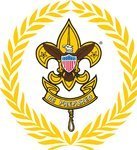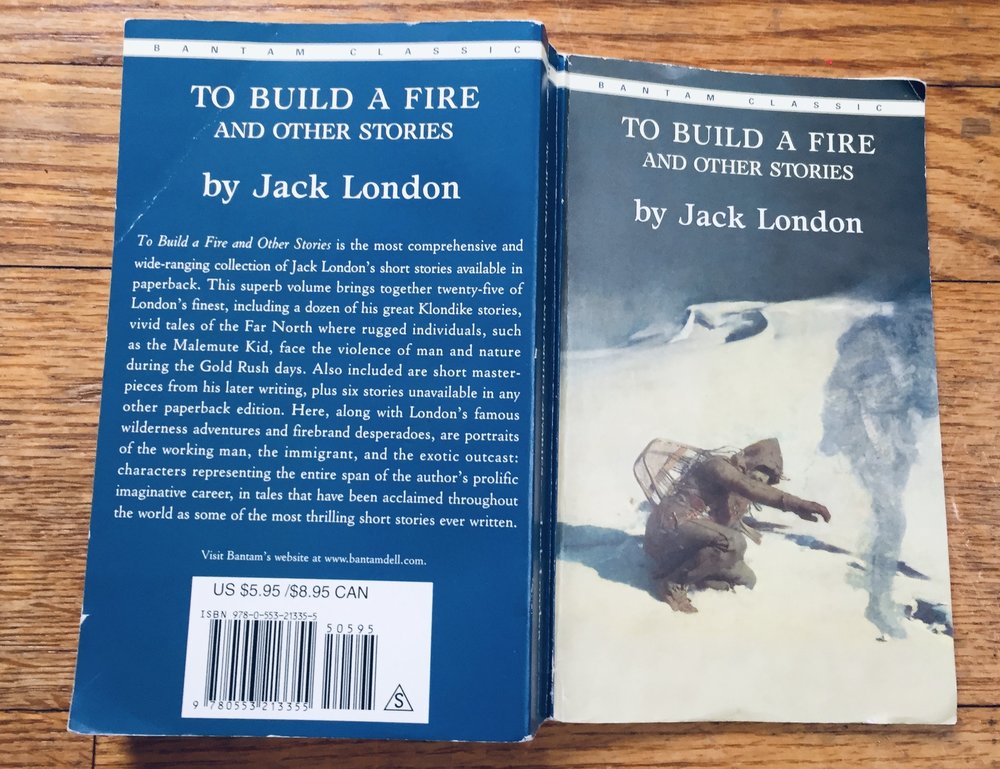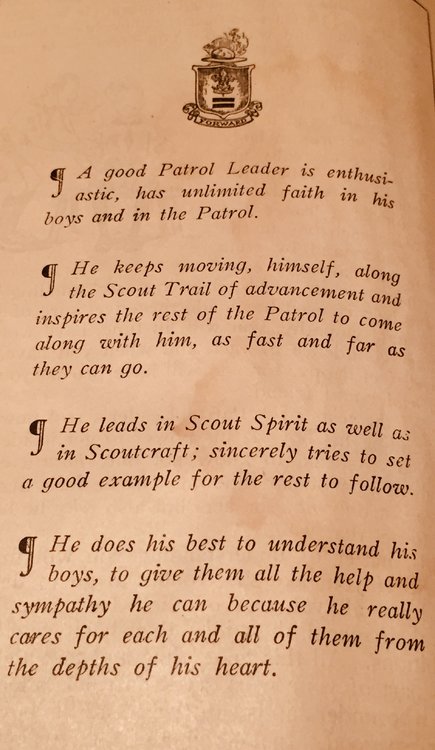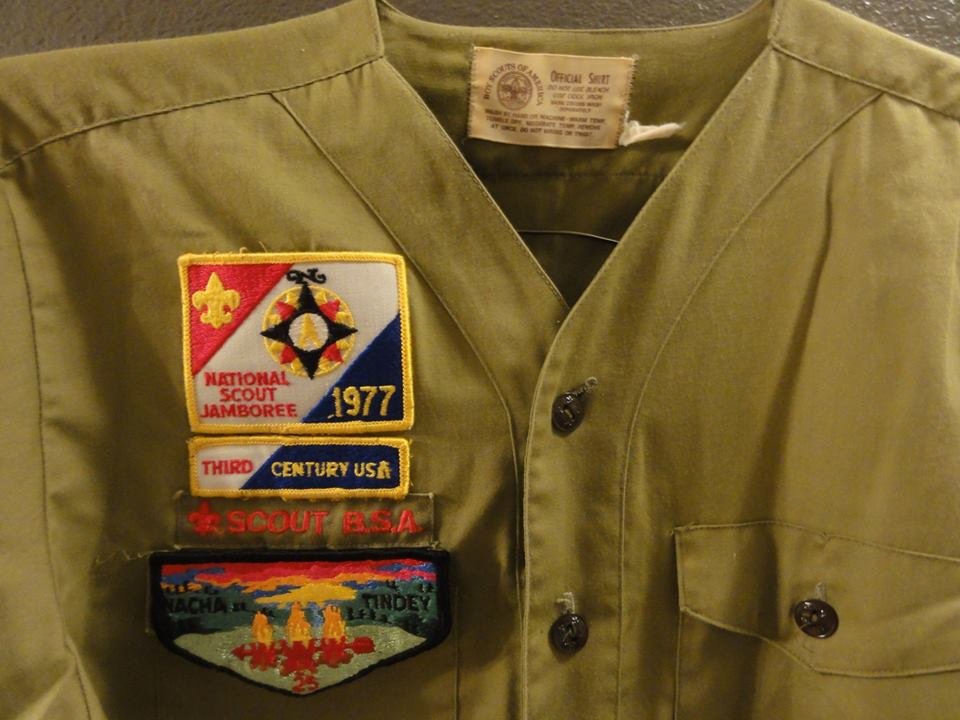-
Content Count
952 -
Joined
-
Last visited
-
Days Won
22
Content Type
Profiles
Forums
Articles
Store
Posts posted by LeCastor
-
-
We've already veered far away from SSScout's question of what we will call Scouts in Scouts BSA, so I don't feel too bad responding to one of the tentacles of this thread.
The telling of the "why" is one of the key aspects in Working the Patrol Method:
https://www.scoutleadership.com
I found this book most insightful and have used it to makes illustrations and tell timely stories when encouraging others to lead with "the why".
Also, there is Simon Sinek's book Start With Why:
Isn't it funny that we have to be reminded to take this simple step when explaining things?
-
 1
1
-
-
Unfortunately, she'd be about a five-hour drive from my District, but I'd happily recruit her as an ADC!

On a different note, I worked in NW WI for a time a few years back (in the environmental interpretation field) and always enjoyed taking trips up to the Gordon area. It's always scary to know you've been to places where evil lurks. I'm glad Ms. Nutter was there when she was!
Now if we could find all the other missing kids in WI...and elsewhere.
-
Have any of your Councils put on a College of Commissioner Science? If so, how has it gone? If not, why not?
Have any of you completed your Doctorate of Commissioner Science? If so, have you found it useful to your Commissioner Service? What were your thesis topics?
-
41 minutes ago, fred8033 said:
I'm still confused. Is "American Indian Affairs (AIA)" something you created or is it an organization provided by local native american tribes ?
-
1 hour ago, dkurtenbach said:
I don't think the original Order of the Arrow induction ceremony as depicted in the video really has anything to do with "leadership," and doesn't really address "service" either, at least directly.
I think it says loads about Servant Leadership.
-
NOTE: For those interested in pursuing some thoughts about the Order of the Arrow regaining its path to an honor camper society, I have created a new topic in the Order of the Arrow Sub-Forum.
-
We are veering off the subject at hand: leadership through service. Let's try to steer back on course. Otherwise, I can split off several of these posts into another topic for the Order of the Arrow sub-forum.
*********
Each year about this time, I reread selected Klondike stories by Jack London. In reading "In a Far Country" this morning I was moved by a specific passage that I think is a supplement to the initial post outlining key aspects of servant leadership. Describing the hardships of living in the cold North, London says this of an individual:
"For the courtesies of ordinary life, he must substitute unselfishness, forbearance, and tolerance. Thus, and only thus, can he gain that pearl of great price, --true comradeship. He must not say "Thank You;" he must mean it without opening his mouth, and prove it by responding in kind. In short, he must substitute the deed for the word, and spirit for the letter."
-
 1
1
-
-
Hi all,
The reason I posted this video was not to critique the video itself. Rather, it was to reflect on the messages given within the video. @sst3rd, I can sense you are having some conflicts with the present state of the OA and I can appreciate your point of view. However, my takeaways from the video are:
1) good leaders give a hand to others, lifting them up and helping them achieve common goals and
2) we are stronger together, not divided.
Thank you for your thoughts on the OA, though. There has been a significant change in many facets of the program and your concerns are valid. My home Lodge went through some rough times earlier this year and it was hard for many long-timers to come to terms with change. Personally, I miss the OA of my youth but I know its an evolving thing and nothing ever stays the same over time.
Thank you, everyone, for your dedication to Scouting and today's young people. What we do here is much bigger than ourselves. Perhaps some of you have been involved for long enough that your Scouts return 10-20 years later to thank you for doing something you felt was insignificant at the time. What we are doing in our Scouting roles, however trivial it may seem, is impacting the lives of our youth and that is what makes a huge difference in our collective futures.
-
 1
1
-
-
This is an Order of the Arrow video depicting the first initiation sequence but I believe the message transcends the OA sub-forum. We can all learn from the three tasks demanded in the video. Please have a look and then take a moment to reflect on the messages given by E. Urner Goodman and Caroll Edson:
-
 1
1
-
 1
1
-
-
Welcome @FormerBSA to our Forum.
-
 1
1
-
-
- Popular Post
I've been re-reading a history book, created over 15 years ago, outlining the rich background of Scouting in my area. In one particular chapter, the author highlights some pretty cool things that took place during the "Improved Scouting" years, despite the changes that the National Council, BSA introduced in 1972. Dedicated Scouters gave countless hours to mentor, guide, and teach countless young people how to navigate the world and society. This is exactly what each of us is still doing today!
I think the general malaise I feel from reading some posts on this Forum is due, in large part, to the attitude that things aren't as good as they used to be. Well, no, some things are definitely different. However, some things are just the same and will be for many, many years. The Movement of Scouting will carry on even if the organization of Scouting stumbles from time to time.
Our future as a Scouting Movement is as bright as we'll allow it to be. I look at my two-year-old son and see a future Scout just bursting with energy. He's already tramping the woods, picking up pinecones, marveling at the trees, and asking Daddy to help him light fires. He'd even gladly accept a pocketknife if I gave him one. 😉 The other day we stopped into a Scout Shop while traveling so Daddy could pick up some CSPs from the area, and my little one proudly told the Shop staffers "A...be a Scout!" It brought a tear to my eye.
I realize controversy invites loads of dialogue and emotions run hot on different sides of the issue at hand. What I yearn for on this forum and in discussions with my fellow Scouters is talk of fires, pocketknives, OA adventures, camping, Merit Badge Counselor success stories, etc. So I challenge each of you to give the Issues and Politics forum a break for ONE DAY and come back to one of the other sub-fora, writing about some successes you've had recently and focusing on the bright future of Scouting.
-
 1
1
-
 5
5
-
Last weekend, as I spoke at the memorial service for a very influential Scouter from my teenage years, I was overcome with emotion, not just from the memories of a loved one taken at a young age. Unbeknownst to me, 3/4 of the attendees were Scouters and I was the only one wearing my uniform. I wore it because I think about my Scoutmaster and his late wife each time I put on my shirt. Underneath my shirt I wore a special t-shirt I received while working on staff of a district camporee in 1994. As I was sharing a second story with the assembled crowd, I unbuttoned my uniform shirt to show off that very same t-shirt I had received 24 years ago. You should have see the faces light up! I was immediately overcome with cries of "I have that shirt, too!" and "I can't believe that was so long ago!" I wear that shirt at least once a week and have done so since 1994; it's a wonder it's not full of holes by now!
Those Scouters had an indirect impact on my youth experience though I don't recall ever meeting them. I know they helped shape that same camporee in 1994 and trained the volunteers who mentored me throughout my youth experience in the Cataouatche District of the New Orleans Area Council. The stories we all shared last weekend illustrate the lasting impact Scouting has on so many young people. Scouting is so much more than an organization; it's a way of life.
I truly can't see the Boy Scouts of America going away. Sure, there may be some changes along the way, but I doubt we'll see the BSA fold. Scouting is woven into the fabric of so many lives.
-
 2
2
-
 2
2
-
-
13 minutes ago, qwazse said:
You could leave them a list, but lists are hard. Frameworks are easy.
Completely agree! I wouldn't want to hammer these Patrol Leaders with a list.
I think Green Bar Bill's 4-part list, though, sums it up as you and I have done so here.

from Handbook for Patrol Leaders, 1929
-
Thanks, @MattR. Here are ten things that popped into my head as I sat down to type, in no particular order:
1. Every member of the Patrol needs to be, consistently, given responsibility/responsibilities--at Patrol meetings, on Patrol hikes, in Patrol camps, etc.
2. Remember the Golden Rule--treat each Patrol member as you would like to be treated.
3. When dealing with conflicts, take a moment to see what you've been doing and then come up with a different approach.
4. As a Patrol Leader, you should be constantly striving to improve yourself and encouraging others around you to do the same--advancement, continuing training
5. Contact your Patrol members frequently to check in and thank them for their hard work--showing you care is important as a leader.
6. Make sure you listen to each member of the Patrol--truly listen so that you can help each member succeed.
7. Be Prepared at each Patrol Leader's Council meeting--taking good notes and always having ideas to share each time shows the SPL/SM you are serious.
8. When a project needs to be done, a Patrol Leader gets his/her hands dirty, rolls up his/her sleeves, and participates as much as each Patrol member.
9. Encourage each Patrol member to participate in every camping trip, hike, and activity as much as he/she is able.
10. When in doubt always remember the Ideals: Scout Oath and Law, Motto and Slogan, Outdoor Code, etc.
There are no doubt many, many more take-aways I'd like each Patrol Leader to glean from this experience. But those listed above have been helpful for me as a Patrol Leader, Senior Patrol Leader, Den Chief, Junior/Assistant Scoutmaster, Scoutmaster, Unit Commissioner, District Commissioner, and Wood Badge course director.

-
 1
1
-
-
I think we need to try to wrap our minds around giving the Patrols more life and meaning and resist the urge to fill a chart from the Scoutmaster's Handbook where the Troop has QMs, Scribes, etc.
In Wood Badge, for example, there is a Troop Scribe and then there are 8 Patrol Scribes who submit the goings-on from each of the 8 Patrols. The Troop Scribe shows the rest of the Troop what each Patrol has been up to through the writing of 8 Patrol Scribes.
-
12 minutes ago, fred8033 said:
Do you then have a senior quartermaster patch and then patrol quartermaster patches?
The patch isn't the point. The "job" is the idea here.
How many times have we seen a Troop campout where 2-3 Scouts from six different Patrols showed up, causing the Scoutmaster to make the decision to create an ad hoc weekend-long Patrol? Might the fact that each Patrol member has a job create a sense of ownership where each member is compelled to show up consistently for each outing?
-
 1
1
-
-
@DuctTape and @fred8033, you see my point now.
How many times have Scouts gotten bored and quit because they had nothing to do? A Patrol Leader should be working with each member of the Patrol to make sure responsibility and accountability is shared.
35 minutes ago, qwazse said:The real cost to over-delegating is a PL stuck with 7 boys who chant "that's not my job" when the correct answer is "Sir, you say jump, I say how high, sir!"
I don't think Green Bar Bill ever said anything like this. Instead he quoted the Three Musketeers: "All for one, and one for all!"

-
12 minutes ago, qwazse said:
The troop's QM in this context is to get account for the troop gear used by 64 scouts.
I hear what you're saying, Q.

Now, I would ask why the Troop needs a QM if each Patrol has its own set of gear in the closet/trailer/corner. I don't want to get hung up on QMs or any particular role here. My point is giving a Troop position takes away from a Patrol position. If we give greater responsibility to more Scouts are we not giving more accountability to more youth?
-
I think the pushback, and some shown here so far, is that adults want to make everything "formal" and "official". The Patrol Leader is the one who makes the decision about who does what, based on each Patrol members strengths. The Patrol Leader is the only "formal" and/or "official" role as far as the Scoutmaster should be concerned.
Now, I don't think there's anything wrong with a Troop of 8 Patrols to have 8 Scouts with QM patches on their sleeves. See what I mean?
-
Thanks, all, for the discussion thus far!
1 hour ago, qwazse said:There's lots of jobs to do. And most have to be done every camp out. So, somebody has to commit to doing those jobs. The PL could commit each scout to doing the same job for a few months, or each month, the PL could ask who's doing what each time. Now, if he has a kid who is really good at doing one of those jobs, he might make him the patrol cook, QM, pole-carver, photo-journalist, pyro-technician, or whatever ... His patrol, his call. The more responsibility given to the PL, the better.
This is the point I'm trying to make. Did you roll your eyes at me?
 35 minutes ago, fred8033 said:
35 minutes ago, fred8033 said:My question is why?
- Can't be for advancement. "Strictly speaking", only the patrol leader job counts for advancement.
- Why does each patrol member have to have an official job?
Quite simply, my answer is because it's the Patrol Method. Not everything one does has to be for advancement. If you are doing something strictly for advancement, then I don't think you are doing it for the right reason(s).
25 minutes ago, T2Eagle said:I have to disagree LeCastor, the essence of a patrol is that they organize themselves, with some leadership and formality in the form of a PL. A functioning patrol will probably fall into a recurring set of roles, the same way any group of people will, but there's no virtue in compelling that or spending a lot of time trying to formalize or enforce that.
If a patrol is struggling then defining some roles for a period of time until they mesh together and find their own level may be helpful, but for the most part the patrols know what tasks they need to complete and are best left being held accountable for completing them.
How is the disagreeing with me?
Let's have a moment of Green Bar Bill wisdom:
"You will never get anywhere with a one-man system. The farthest if can bring your Patrol is into the ditch and one might assume that that is exactly the place of all places where you don't want to see it.
"If you want it to succeed you will have to build up a system of organization in which every one of the boys is a part with special duties and special work to perform for the good of the Patrol.
"As you work along you will soon find that the leading of a Patrol is much more than a one-man job, and you will soon find that you need the help of every one of your boys to take care of special details."
(page 67, Handbook for Patrol Leaders, 1929 1st edition)
-
As a Commissioner and trainer of Scoutmasters, I often suggest (strongly) that every Scout in a Patrol needs a job to do. That means every Patrol should have a PL, APL, scribe, quartermaster, historian, webmaster, etc. I don't know how many times I've heard the pushback that, "our Troop already has a quartermaster".
Patrols should have gear, a blog, meetings (requiring a scribe to take minutes), etc. Troops don't need a quartermaster as much as a Patrol does, provided the Patrol has its own gear (which it should). I think a Troop quartermaster who works with Patrol quartermasters is a good idea, though.
In essence, the more responsibility given to the Scouts the better!
-
52 minutes ago, qwazse said:
while you guys were each proudly a Scout BSA
1 hour ago, desertrat77 said:LeCastor, here's mine. I was at Philmont during the 77 Jambo.
Sorry to mis-lead you two.
 I joined as a Bear Cub in 1987. The uniform shirt I shared belongs to a recently-retired Scoutmaster from our area.
35 minutes ago, desertrat77 said:
I joined as a Bear Cub in 1987. The uniform shirt I shared belongs to a recently-retired Scoutmaster from our area.
35 minutes ago, desertrat77 said:but the campfire scuttlebutt and hints in official literature indicated that indeed, the BSA was leaning to going coed at that time.
Yes, @desertrat77, our Scout Executive shared that with us a few days before we all learned of this lawsuit. I think BSA was trying to pave the way for merger in the 1970s and "Scout BSA" was a way to make it easier?
-
 1
1
-
-
14 minutes ago, DuctTape said:
I think the best GBB Patrol stuff (outside the PL Handbook) is in the first Fieldbook. It is basically a "how to" manual from start to finish on how to be a patrol and do patrol things. A patrol could even just go in order, page by page.
I agree, DuctTape.
So why don't we have that same level of depth anymore? Why is the Patrol Method only touched on for two pages in the 13th edition? Do you think this is why neither Scoutmasters nor Scouts know how to effectively implement and use the Patrol Method?
I guess we could buy all remaining copies of GBB's books and distribute to our Scouts. Or maybe we could petition the BSA to reprint them in bulk for today's Scouts to use??!!
-






Just got 1 girl
in Cub Scouts
Posted
Hi @Momleader. Congratulations on recruiting a new Cub Scout!
As for answering your question, you should refer this to your Unit Commissioner, or District Commissioner. If you can't find those two, you should then send your inquiry to your District Executive.